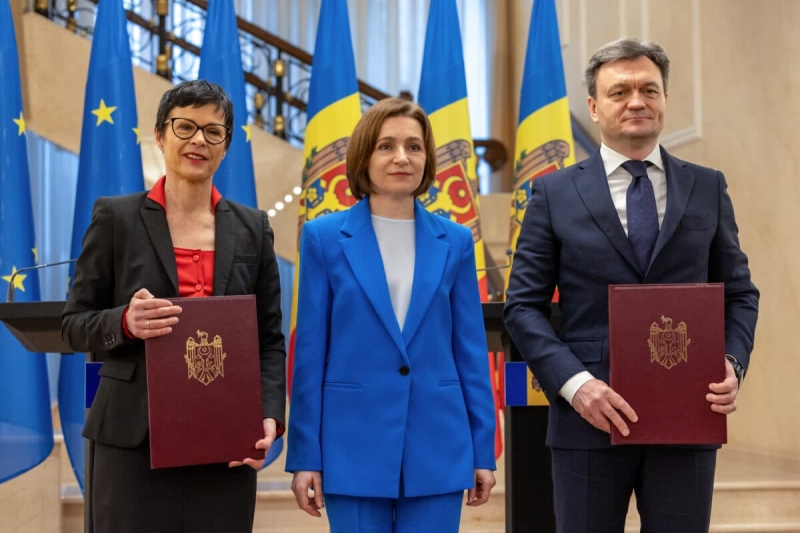LtoR, European Commissioner for Enlargement Marta Kos, Moldovan President Maia Sandu and Moldovan Prime Minister Dorin Recean (R) pose after signing bilateral documents as part of an official visit at the Moldovan Presidency headquarters in Chisinau February 4, 2025, as the European Union is offering the Republic of Moldova a support package to developp the country’s energy resilience. A letter of intent has been signed, setting out the strategy by which the Republic of Moldova will strengthen its energy security and the steps it will take in the next 2 years to avoid being affected in any way by Russian energy blackmail. (Photo by Elena COVALENCO / AFP)
Chisinau, Moldova — The European Union said Tuesday that it would support Moldova with 250 million euros ($258 million) this year to help bolster the country’s energy security after the crisis triggered by Russia cutting off gas supplies.
Russia’s Gazprom halted supplies to Moldova’s breakaway region of Transnistria on January 1 over a debt dispute with the Moldovan government, leaving its roughly 400,000 residents without any gas for heating or hot water.
Transnistria declared independence after the break-up of the Soviet Union, but is internationally recognized as part of Moldova.
The aid announced Tuesday is part of a two-year plan aimed at “decoupling Moldova from the insecurities of Russian supply of energy and fully integrating it in the EU energy market,” the European Commission said in a statement.
“Russia is blackmailing Moldova with energy, just like it once tried with the EU. Our comprehensive strategy… will put an end to this,” European Commission head Ursula von der Leyen wrote on X.
After a press briefing in Chisinau, the EU’s Commissioner for Enlargement Marta Kos wrote on X that “A stronger economy and energy security are key for Moldova’s prosperity in Europe”.
Moldova’s President Maia Sandu hailed the new funding, saying the EU was “always… here to support us in difficult situations”.
Part of the aid will help offset higher electricity prices, which have almost doubled in the country after Russia cut supplies.
The government in Chisinau used to rely for much of Moldova’s electricity on a major power plant in Transnistria, but after Russia cut off gas supplies it shifted to imports from neighboring Romania, an EU member.
The EU will also provide 60 million euros ($62 million) to the residents of Transnistria, though the aid will be “subject to steps being taken on fundamental freedoms and human rights”.
Moldova started transporting EU-funded gas to pro-Russian Transnistria on Saturday, after an initial emergency aid of 30 million euros ($31 million) from the European Union.
Moldova has accused Russia of provoking an energy crisis to destabilize the country ahead of parliamentary elections expected in autumn, with the aim of having a pro-Russian government installed in Chisinau.


